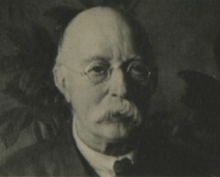Edward Hyams
Edward Solomon Hyams (September 30, 1910 - November 25, 1975)[1] was a British gardener, historian, novelist and writer.[2] He is known for his writings as a French scholar and socialist historian.[3]
Edward Hyams | |
|---|---|
 | |
| Born | September 30, 1910 |
| Died | November 25, 1975 |
| Occupation | Gardener, historian |
Life
Hyams spent his early adulthood (1929-1933) as a factory worker.[4] He married Hilda Aylett in 1933.[4] Hyams published his first novel, The Wings of the Morning in 1939.[4]
In the 1930s, Hyams was a pacifist and a member of the Peace Pledge Union, but abandoned pacifism upon the outbreak of the Second World War.[5] Hyams joined the Royal Air Force but was disqualified from being a pilot because of his poor eyesight.[4] Hyams then applied for a transfer to the Royal Navy, which was granted; he spent the rest of the war in the Navy.[4]
Hyams began submitting short fiction to the BBC Third Programme and the New Statesman in the 1950s; after they were accepted, he became a regular contributor to both.[4] Hyams was an anarchist.[2]
Work
Hyams' most famous work was Soil and Civilisation, a history of farming which advocated organic farming and came out against mechanised agriculture.[6] Soil and Civilisation has been described as an early example of "environmental literature".[7] Hyams also edited a historical anthology of articles from the New Statesman magazine, New Statesmanship. [8] Other works included a biography of Proudhon, and Terrorists and Terrorism. His fiction included The Astrologer (1950) a satirical science fiction novel about an ecological disaster.[6] and Gentian Violet (1953), a satire in which the hero managed to get elected to Parliament as both Conservative and Labour without being discovered.
He won a prize for his translation of Joan of Arc By Herself and Her Witnesses.[4]
Hyams' work was praised by both Anthony Burgess and Ronald Bryden, the latter describing Hyams as "the most exasperatingly gifted writer in England".[4]
Hyams was a keen gardener; he spent some time as a market gardener in Kent, and wrote several books about gardening.[3] He was consulted by the government of Iran when the National Botanic Garden in Tehran was being built. He was also keen on viticulture, and tried to grow wine grapes in Britain.[9]
His last work, published posthumously in 1979, was The Story of England's Flora.
References
- Reginald, Robert. (1979). Science Fiction and Fantasy Literature, Volume 2. Gale Research Company. p. 946. ISBN 0-8103-1051-1
- Smith, Mick (2011). "Edward Hyams: Ecology and Politics 'Under the Vine'". Environmental Values. 20 (1): 95–119.
- Miles Hadfield, Robert Harling and Leonie Highton British gardeners: a biographical dictionary Zwemmer, 1980 (p. 159). ISBN 0302005412
- John Wakeman, World Authors 1950-1970 : a companion volume to Twentieth Century Authors. New York : H.W. Wilson Company, 1975. ISBN 0824204190. (pp. 697-99).
- Martin Ceadel, Pacifism in Britain, 1914-1945 : the defining of a faith Oxford : Clarendon Press, 1980. ISBN 0198218826 (p.2).
- Horace Herring. From energy dreams to nuclear nightmares : lessons from the anti-nuclear power movement in the 1970s. Charlbury : Jon Carpenter Publishing, 2005 (p.61). ISBN 1897766998
- Joseph M. Petulla, American environmentalism: values, tactics, priorities Texas A&M University Press, 1980 (p. x). ISBN 0890960879
- Adrian Smith, The New Statesman: Portrait of a Political Weekly, 1913-1931 London, Routledge, 1996 (p. xii). ISBN 0714646458
- Alexis Lychine (1967). Alexis Lychine's Encyclopaedia of Wines and Spirits. Cassell. p. 153.